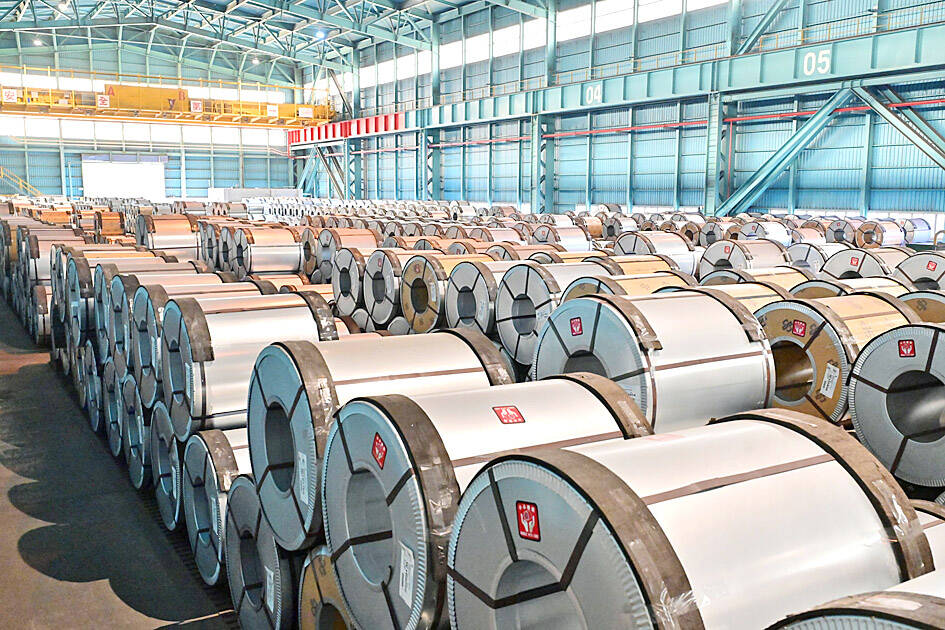China Steel Corp (中鋼) yesterday said it would raise its prices slightly for some products and leave others unchanged for domestic deliveries next month, after leaving them unchanged for two consecutive months.
The nation’s largest steelmaker said in a statement that it had accounted for downstream customers’ inventory replenishment demands and their export competitiveness, as the global steel market has staged a steady recovery.
As a result, it would increase prices for hot-rolled steel plates and coils, and cold-rolled steel coils by NT$300 per tonne (US$9.25), while keeping prices unchanged for other items such as electro-galvanized steel coils, hot-dipped zinc-galvanized steel coils and electro-magnetic steel coils, the Kaohsiung-based steelmaker said.

Photo courtesy of China Steel Corp
“The global steel market still faces oversupply, although demand is improving. Therefore, steel prices might stabilize in the short term due to seasonal demand or in response to inventory adjustments ending, but the company would not see a marked improvement in its product spreads in the medium term until there is further consolidation in the industry,” Fubon Securities Investment Services Co (富邦投顧) said in a note ahead of the release of China Steel’s price data.
Spreads refer to the difference between raw material costs and product prices, with China Steel facing narrower spreads amid rising costs over the past few quarters, indicating continued profit margin pressure.
In the first quarter, the firm posted an operating profit of NT$769 million, down 71.1 percent from the previous quarter, although revenue grew 6.1 percent sequentially to NT$93.75 billion and sales volume increased 6 percent to 2.88 million tonnes.
The decline in operating profit was mainly because prices of iron ore and coking coal rose 13 percent and 31 percent respectively quarter-on-quarter, while China Steel’s product prices only increased by a maximum of 5 percent over the quarter, the company said late last month.
First-quarter pretax profit fell 46.3 percent quarter-on-quarter to NT$1.48 billion, but improved significantly from a year earlier thanks to gross margin and sales volume growth, as well as non-operating investment and foreign exchange gains, the firm said.
China Steel yesterday said that raw material prices are still increasing due to an improved outlook in China, with iron ore costing US$115 to US$120 per tonne, up more than 20 percent from last month’s lows, and coking coal costing US$240 to US$245 per tonne, an increase from US$220 to US$230 per tonne a month earlier.
However, the company said it is positive about the price outlook in the near term, as several European steel mills recently announced price increases and signs of a rebound are starting to emerge in Southeast Asia.
Chinese peers Baowu Steel Group Ltd (寶武鋼鐵), Angang Steel Group Co (鞍山鋼鐵) and Benxi Steel Group Co (本溪鋼鐵) also slightly raised their steel plate prices for next month, further bolstering market sentiment, China Steel said.

Zhang Yazhou was sitting in the passenger seat of her Tesla Model 3 when she said she heard her father’s panicked voice: The brakes do not work. Approaching a red light, her father swerved around two cars before plowing into a sport utility vehicle and a sedan, and crashing into a large concrete barrier. Stunned, Zhang gazed at the deflating airbag in front of her. She could never have imagined what was to come: Tesla Inc sued her for defamation for complaining publicly about the vehicles brakes — and won. A Chinese court ordered Zhang to pay more than US$23,000 in

Taiwan Semiconductor Manufacturing Co (TSMC, 台積電) yesterday said that its investment plan in Arizona is going according to schedule, following a local media report claiming that the company is planning to break ground on its third wafer fab in the US in June. In a statement, TSMC said it does not comment on market speculation, but that its investments in Arizona are proceeding well. TSMC is investing more than US$65 billion in Arizona to build three advanced wafer fabs. The first one has started production using the 4-nanometer (nm) process, while the second one would start mass production using the

A TAIWAN DEAL: TSMC is in early talks to fully operate Intel’s US semiconductor factories in a deal first raised by Trump officials, but Intel’s interest is uncertain Broadcom Inc has had informal talks with its advisers about making a bid for Intel Corp’s chip-design and marketing business, the Wall Street Journal reported, citing people familiar with the matter. Nothing has been submitted to Intel and Broadcom could decide not to pursue a deal, according to the Journal. Bloomberg News earlier reported that Taiwan Semiconductor Manufacturing Co (TSMC, 台積電) is in early talks for a controlling stake in Intel’s factories at the request of officials at US President Donald Trump’s administration, as the president looks to boost US manufacturing and maintain the country’s leadership in critical technologies. Trump officials raised the

From George Clooney to LeBron James, celebrities in the US have cashed in on tequila’s soaring popularity, but in Mexico, producers of the agave plant used to make the country’s most famous liquor are nursing a nasty hangover. Instead of bringing a long period of prosperity for farmers of the spiky succulent, the tequila boom has created a supply glut that sent agave prices slumping. Mexican tequila exports surged from 224 million liters in 2018 to a record 402 million last year, according to the Tequila Regulatory Council, which oversees qualification for the internationally recognized denomination of origin label. The US, Germany, Spain,